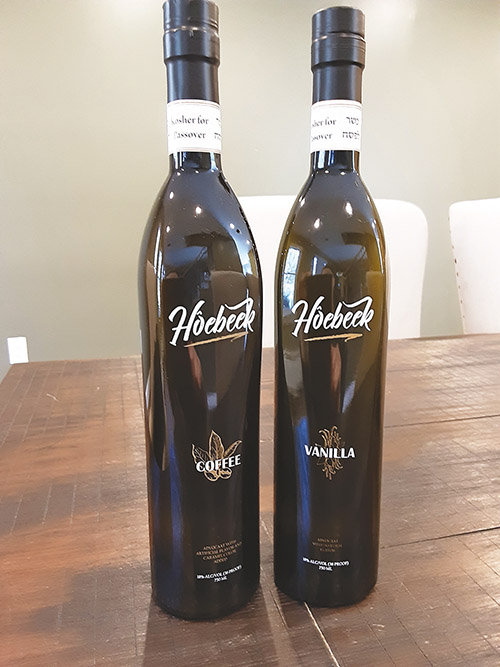
Yisroel Messinger is an unlikely liqueur producer.
A Hasidic writer and editor of Sifrei Kodesh, Rabbi Messinger is most comfortable in his library or the beit midrash. But his family’s history of craft production and his analytical nature made the challenge of creating top-quality kosher liqueurs irresistible.
Yisroel’s father, Rabbi Moshe Messinger, also an author of numerous Sifrei Kodesh, tinkered with liqueurs as a hobby, trying to recreate the products he remembered helping his own father produce in Galanta, Czechoslovakia. After escaping with his family from behind the Iron Curtain to New York in the mid-1960s, the young Moshe experimented and created a Vanilla Advocaat liqueur that he would supply to local shtiblach. Yisroel grew up hearing these tales and tasting the homebrewed invention.
Yisroel’s maternal grandfather, descendent of the famous rabbinic Bengio family exiled from Spain to Morocco in 1492, was also an inspiration. Regaling his grandchildren with stories of his fig-harvesting exploits in the orchards surrounding Tangiers, he detailed the distillation process that his own father employed to produce an exceptional Mahia, the traditional Moroccan alcoholic drink, from the freshest of ingredients.
Driven to build upon his father’s, grandfathers’ and great-grandfather’s legacy, Yisroel and his wife, Roizy, toiled to perfect Moshe’s decades-old vanilla recipe. Finding success, together they formulated a coffee liqueur, which soon garnered a following, too. With confidence derived from these triumphant experiences, they tackled the most challenging of the popular flavors: chocolate. After much research and trial and error, the Messingers solved the difficulties, concocting a rich and creamy, yet parve, chocolate liqueur.
Enjoyed either alone as a digestif at meal-end (“neat” or “straight”), over ice (“on the rocks”), in coffee, in cocktails or as part of a baking or cooking recipe, liqueurs are produced by mixing an alcohol base with a sweetener and plant materials for flavor. Liqueur alcohol-by-volume (ABV) is usually between 15% and 30%.
Liqueur utilizes “liquor” such as vodka, brandy or whiskey as its base spirit. Despite the confusion caused by the similar sounding names, liqueur is a sweet, flavored alcohol product, while “liquor” is an unsweetened, potent drink produced by distilling wine or beer in order to separate out the alcohol from the water in the fermented beverage. Liquor is usually consumed at 40%-55% ABV.
Popular methods for adding flavors to liqueurs include macerating (in cold water), infusing (in hot water), distilling (as with spirits) and extracting (using pressure). Rabbi Messinger has developed expertise in these methods, as well as related fields, such as food safety, production logistics and regulatory compliance, all in pursuit of creating the tastiest liqueurs.
Naturally a shy homemaker and mother, Roizy has led the brand’s marketing efforts, from helping design the logo and bottles, to finding pourers to attend trade shows and tastings, to promoting the products with social media influencers by creating pastry, cocktail and dessert recipes.
Part of Hôebeek’s marketing success has been in tweaking their process to create special seasonal products. For Pesach last year, the Messingers rolled out a kosher L’Pesach Vanilla Advocaat. They then released a limited production Cholov Yisroel Milk Chocolate liqueur in time for Shavuot. For this year’s Pesach 5782, the Messingers added a second kosher for Passover variation of their offerings: coffee now joins vanilla. In an uncommon parallel to the much sought after yellow-capped seasonal beverage, their kosher for Passover vanilla and coffee liqueurs arguably are superior to the standard version.
While nothing compares to sampling the product for oneself, here are our quick impressions:
Hôebeek Vanilla Advocaat Kosher for Passover, Parve: Vanilla bean on the nose, with a slight hint of the vodka base. Bright and creamy, it is deep, mildly viscous and rich, reminiscent of vanilla pudding or custard with subtle sweetness and just a touch of heat to remind you that it is an adult beverage.
Hôebeek Coffee Liqueur Kosher for Passover, Parve: Light brown in color, with an aroma of Arabica beans and a whiff of vodka. Light on the tongue, it is mid-bodied and tastes like a latte, with a perfect balance of flavors: a trace of vanilla, gentle sweetness, a suggestion of bitterness and mild warmth to the finish, confirming that it has 18% alcohol by volume.
Both these alcoholic drinks are wonderful out of a glass, with dessert or a snack, but they are also great additions to recipes.
Together, Rabbi and Mrs. Messinger, in their modest way and on their own terms, have created some of the highest quality liqueurs on the kosher market today.
Best wishes for a Chag Kasher v’Sameach!
Teaneck’s Shimon Oppenheim works for Red Garden Imports.











